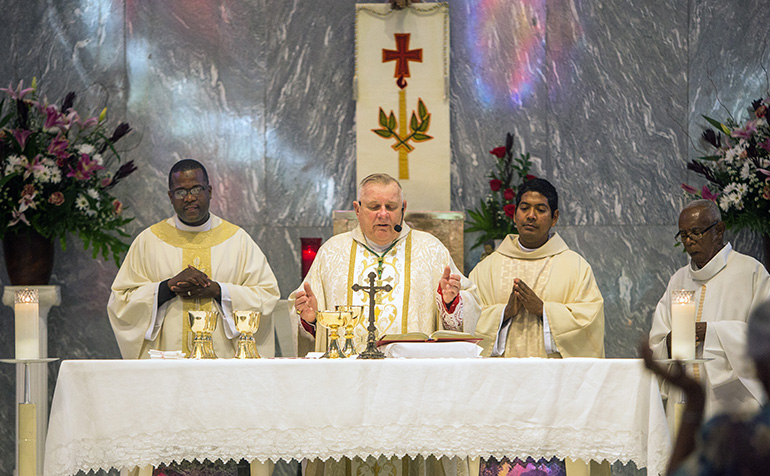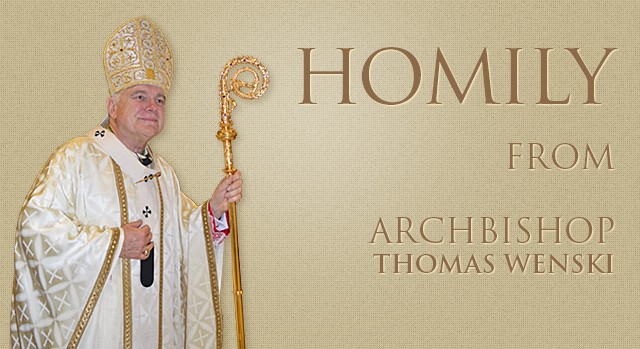By Archbishop Thomas Wenski - The Archdiocese of Miami

Photographer: MARLENE QUARONI | FC
Archbishop Thomas Wenski celebrates Mass. At left is Msgr. Chanel Jeanty, St. James' pastor; at right is parochial vicar Father Juan Alberto Gomez.
Archbishop Thomas Wenski preached this homily June 24, 2018 at St. James Church, North Miami, during a Mass with the Miami Archdiocesan Council of Catholic Women and seven Haitian mothers-to-be who were receiving layettes for their children.
Children represent the future. Many hopes, many dreams are invested in our children. Today, the Archdiocesan Council of Catholic Women come to St. James this morning for Mass. And that’s what brings me here today as well. I and these women are grateful to all the parishioners here – and to your pastor, Msgr.[Chanel] Jeanty – for your warm welcome. And because children do represent the future, the Council of Catholic Women will present young mothers from the parish with beautiful layettes for their babies. It’s a way of saying that the entire Catholic community also has hopes and dreams for the children that receive the layette – and for all children.
“What will this child become?” This was the question asked by Elizabeth and Zachariah’s relations and friends when John the Baptizer was born. And this is the question that we ask about our sons and daughters, our nephews and nieces, our grandchildren. Children are the future – and they carry our hopes into the future.
In today’s Gospel reading, hope is born for Elizabeth and Zachariah. Elizabeth was well beyond child-bearing age – and so this hope seemed to be beyond the realms of possibility and for Zachariah, at least at first, beyond belief.
But, our God, as Pope Francis likes to say, is a God of surprises. And he is also a God who keeps his promises: He is faithful even when we are not.
And so, with the birth of John the Baptist, hope is born – and not only for Elizabeth and Zachariah, but for all those who in Israel awaited the fulfillment of God’s promises. When all seemed lost – for the glory of David’s kingdom was only a distant memory – God acted. Yes, hope is born, for Elizabeth and Zachariah, for the remnant of Israel, and for us. For John is the prophet, the precursor, who opens the way for he who is to be the Lamb of God, the one who will save us from our sins. John is the prophet who bridges Old and New Testaments and introduces to the world Jesus Christ, its one and only hope, the hope that will never disappoint.
John is born. Elizabeth’s neighbors and relations, the Gospel tells us, heard that the Lord had shown great mercy to her and they rejoiced with her. These people must have been pretty good people – first of all, because they rejoiced when something good happened to their friends. (This is an attitude we should all try to emulate – in our world today, with so much competition, so much effort given “to keeping up with the Joneses,” instead of rejoicing over our friends’ good fortunes, we pout.) But, second, they understood that children were “blessings” and not “burdens.”
Children have been in the news a lot this week: children crossing borders, children being separated from their parents. People have conflicted feelings about this — but as we watch our TVs, are these children seen as “blessings” or “burdens”? A lot of migration today is driven by globalization. In itself, globalization which makes the world smaller and borders perhaps less important is neither good or bad. Whether it is good or bad will depend on what we, sinful human beings, make it: Will it be a globalization of solidarity or a globalization of indifference? As Pope Benedict said once: “globalization has made us all neighbors; but it hasn’t made us brothers and sisters.”
But in that little village of Zachariah and Elizabeth, the birth of any child was seen as a blessing; and the birth of this child, born in Elizabeth’s old age, was seen as a miraculous blessing.
So, we should give those who gathered at the home of Zachariah some credit: They recognized that Elizabeth was indeed blessed and appropriately they rejoiced. Every once in a while, especially when we are stressed out (and who doesn’t get stressed out in these days of partisan divisions and political stalemates) we should pause, take a deep breath, and count our blessings – and be happy for them; and, if you are tempted to count other people’s blessings (like what they have and you don’t), Okay, count them – but be happy for them – just as Elizabeth’s friends were happy for her.
But, as they gathered to rejoice with her, they expected that Elizabeth and Zachariah would name the child after his father or one of his ancestors. In other words, like too many of us today, they accepted the blessings of God but wanted to get back to “business as usual.” Thanking a loving and generous God for the blessings he showers upon us and others is, as we say in the Preface at Mass, “right and just” – but it is not sufficient. Elizabeth and Zachariah remember God’s word – the instructions that God gave Zachariah through the angel. Zachariah, deaf and dumb because of disbelief, asks for a tablet and writes: “His name is John.” The response to God’s blessings is gratitude, to be sure; but it also must be obedience. The obedience of faith loosens Zachariah’s tongue and opens his ears.
Too often, the more that God blesses us, the more comfortable, the more complacent, the more apathetic we become. Sometimes, it’s only the hardships and trials we endure that bring us closer to Christ. But Elizabeth and Zachariah show us that the proper response to God’s blessings is obedience and praise. When everyone around them wanted to thank God and then go back to their normal lives, Zechariah chose the higher path.
The people asked, “What will this child become?” We know now the answer to that question. John the Baptist opens the doors of our world to hope. He prepares the way to that hope that is Jesus Christ. God continues to surprise us, because he continues to act in our history, in our lives. Christ is born for us in Bethlehem – and because he comes to live among us, he opens for us, for our children and our families, a future of hope.

